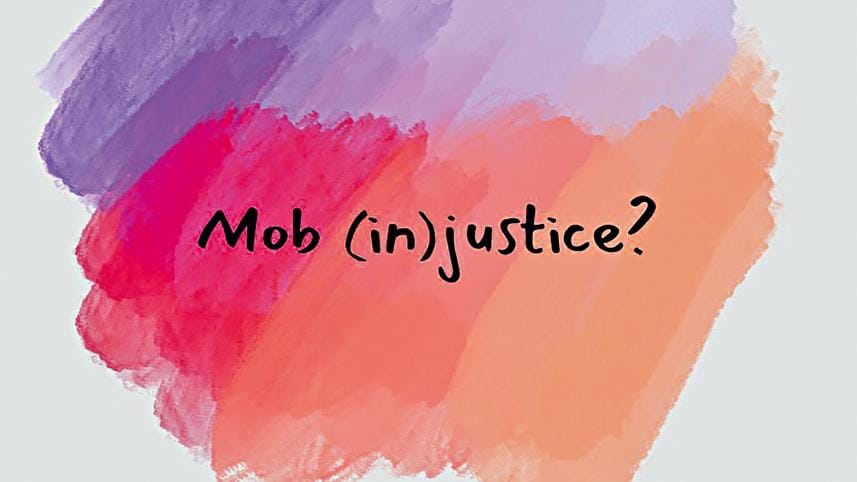The state of mob justice in Bangladesh

Mob justice, also known as vigilante justice, involves a group of people taking the law into their own hands, meting out punishment through violence. The recent surge in mob violence in Bangladesh necessitates a discussion on this topic. According to Social Disorganisation Theory, when institutions like law enforcement and the judiciary are weak, corrupt, or ineffective, people feel compelled to take the law into their own hands. Other contributing factors, such as social inequality, misinformation, or entrenched cultural practices, drive communities to enforce their own version of 'justice' through collective action.
From a legal perspective, mob justice contributes to lawlessness and constitutes a gross violation of human rights, particularly the rights to life, liberty, and security of the person as protected under the Constitution and international human rights instruments to which Bangladesh is party. Article 31 of the Constitution ensures the right to protection of law, stating that every citizen is entitled to be treated only in accordance with law. Moreover, Article 35 provides for the right to a fair trial, including protection from ex post facto laws, double jeopardy, and self-incrimination. However, the prevalence of mob justice in Bangladesh starkly contrasts these constitutional guarantees.
When institutions like law enforcement and the judiciary are weak, corrupt, or ineffective, people feel compelled to take the law into their own hands. Other contributing factors, such as social inequality, misinformation, or entrenched cultural practices, drive communities to enforce their own version of 'justice' through collective action.
Also, the Universal Declaration of Human Rights and the International Covenant on Civil and Political Rights explicitly protect the right to a fair trial and the presumption of innocence. The state's failure to prevent or punish acts of mob justice can be seen as a violation of its obligations under such treaties, which require Bangladesh to ensure that all individuals within its jurisdiction enjoy the rights that are protected by these international instruments.
The Penal Code 1860 addresses crimes such as murder, unlawful assembly, causing hurt, etc. that are often the results of mob violence. Again, the Code of Criminal Procedure 1898 empowers police officers to intervene in situations of unlawful assembly, disperse mobs, and prevent violence. Additionally, the Special Powers Act 1974 empowers the government to act against activities that threaten public order, while the Cyber Security Act 2023 addresses the spread of misinformation that can incite mob violence. However, despite these provisions, enforcement remains a significant challenge, largely due to lack of resources, inefficiency within law enforcement agencies, and political interference that undermines independence of the judiciary.
Addressing the rise of mob justice in Bangladesh requires a multifaceted approach. First, it is essential to enhance the capacity and independence of the judiciary to ensure timely and impartial adjudication of cases. Second, law enforcement agencies must be reformed to improve their effectiveness in preventing and responding to mob violence. Third, there must be a concerted effort to educate the public about the dangers of mob justice and the importance of adhering to legal processes through public awareness campaigns and community engagement. Finally, legal reforms must address the underlying social and economic inequalities that contribute to the rise of mob justice.
While widely condemned for its violent and unlawful nature, mob justice is sometimes perceived to have certain benefits, particularly in societies where formal legal systems are deeply flawed. But in reality, it undermines the rule of law, leading to miscarriages of justice. Moreover, mob justice perpetuates a cycle of violence, as those affected by it may seek revenge, leading to further conflict and instability within communities.
In the context of recent events in Bangladesh, we are seeing an alarming rise of mob justice, where escalating political and social tensions have led to increasingly violent and destructive actions by different sections of people. Conversely, the acts of vandalism and arson violence targeting significant historical, cultural, and architectural sites reveal deep-seated discontent and uncontrolled mob behavior. Such acts not only threaten public safety but also destabilise the socio-political landscape, making it all the more challenging to maintain law and order.
The writer is law graduate from Department of Law, University of Dhaka.



 For all latest news, follow The Daily Star's Google News channel.
For all latest news, follow The Daily Star's Google News channel.
Comments